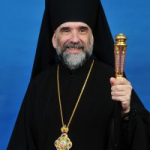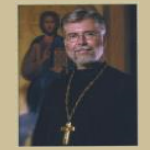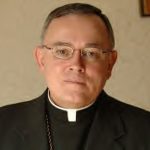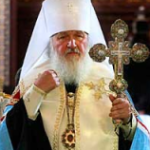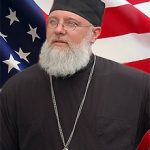
Fr. John A. Peck serves at St. George Orthodox Church in Prescott, AZ and is already well known as the administrator of the “Preachers Institute” and “Journey to Orthodoxy” websites. Recently he launched a site called “Good Guys Wear Black,” which aims to provide a resource for men discerning their vocation to the priesthood. Fr. John was kind enough to answer some questions I had about this new effort.

Father, how did this whole thing get started?
The same things that brought about my other working websites – I had a need as a priest, and nothing to fill that need.
- For Preachers Institute, I needed access to good patristic sermons and good sermon resources, and I was sure that I was not the only one.
- For Journey To Orthodoxy, there was no comprehensive site which inquirers could go to to get information, and read the stories of others who have made the journey. I especially wanted a place for heterodox clergy to see that others have happily and successfully navigated the personal and professional obstacles to entering the Church.
- For Good Guys Wear Black, there is literally nothing to help young men (or not so young men) discern a vocation to Holy Orders. Well, I have young men discerning a vocation to Holy Orders, and some not-so-young men as well. They need some specific direction and guidance about how to think about such a calling. From that, GGWB was born.
It’s as simple as that.
It seems like you’ve come out of the gate running – with, among other things, a news section, pre-made banners for bloggers to use, and complete directory information on seminaries in North America. Were you able to leverage your experience in development of the ‘Journey to Orthodoxy’ and the ‘Preachers Institute’ websites to come out with such a comprehensive site? Who is helping in the site’s development?
New media is constantly changing, and developing the right tools is important. Often, readers request certain things – which is simply giving the ‘customer’ what he is asking for! Like most, I learn from what others are doing, and from my own successes and failures. Fr. Hans Jacobse helped me design the site. He’s great with coding. He also helped me with my other websites and we often collaborate on independent jobs, parish websites or business websites. We are both mission priests, so such work helps us financially.
What, if any, involvement have you had from Orthodox hierarchs, the Episcopal Assembly, or the seminaries themselves?
I’m sorry to say, none. Hierarchs are busy doing bishops stuff, and seminaries are busy doing what seminaries have always done. This kind of work is necessary, but not on the agenda. I would love to partner with each seminary, offer unique vocational materials from each and work together to direct students not only to admissions, but to a vocation specialist.
I’ve mentioned my ideas to a few possible benefactors, people with financial resources that want to see good things done, but despite the fact that I’m doing precisely what they say they would support, I never hear from them again.
I only do this because I feel it is necessary. While many complain and worry about what to do, have meetings, make plans, often nothing gets done. For my part, I have a few skills, and I can at least get this kind of thing done.
What plans do you have for future projects? How do you plan to get the word out to the parish level? Do you foresee mailers to OCF and youth groups, posters for parish halls, etc.?
Honestly, as a parish priest, I’m way too busy to do this myself, but I have no help and no funding from anyone to do it. I think this is a great opportunity for OCF. At the very least, they should invite someone like myself or a diocesan/metropolis or seminary representative to speak on vocations, and perhaps set up a vocations weekend.
Here are a few things we need to get done:
- Parish Materials and Media materials: Apart from getting parishes to host a vocations page on their websites (with links, prayers and information), we need to have posters in each parish, something offered in each Parish bulletin or Newsletter. GGWB will create most of this, but we need to get the awareness of clergy and their staff to get them in.
- Annual Vocations weekend/festival: Either large local parishes and even Diocesan centers/Metropolis centers can host a vocations festival or vocations weekend themselves. This should not be done haphazardly, but with great focus. We need to bring young men discerning vocations together, for a focused week or weekend, and hit hard issues of discernment, seminary, diaconate, priesthood, and get some answers and guidance from experienced clergy. This would be a lot of fun, and very helpful to the prospective student For those who have not had one nearby, we would host an annual one for everyone else. Anyone interested should contact us here at GGWB. We know what to do. It must be done.
- An Annual Preaching Festival: We have a multitude of Oratorical festival participants that, once they leave high school, really have nothing even close to that work until seminary – and seminaries are, frankly, very weak in homiletics. If you preached 10 sermons in your seminary career, you were the exception(I preach ten a month, on a light month). OCF isn’t set up to allow them to continue to speak and hone their preaching skills.Recently, several Orthodox students participated in the national Festival of Young Preachers, and did very well. We need to sharpen the skills of these young men and women now. One young man who was inducted into the Academy of Preaching, after his sermon evidently felt that he, too, had a calling to the priesthood. Since preaching with excellence is the most basic skill of the competent priest, I have encouraged him to pursue it.
What do you think is the biggest surprise to incoming seminarians?
Oh, I can’t answer that. I’m not at a seminary now, so I have no idea what the experience is.
I can tell you that when I went to seminary, it was the fact that despite there being a new log chapel smack dab in the middle of the grounds, no one was allowed to enter it. We walked around it. We worshipped in the museum. It was awful. I can’t describe the experience – how wrong it was. We eventually did get into it to bless it on Theophany, but even that was hard fought. Once in, we weren’t leaving, and it suddenly became the center of our whole experience there. It was alive. It almost breathed. And we were alive in a new and exciting way.

For today’s seminarian, I think a lot would depend on expectations, and the state of discipline at the seminary – and the seminary one attended.
Frankly, from what I’ve heard from seminarians at every seminary (and I have), any significant increase in discipline hardly exists. It’s more like a gentlemen’s code or something. I don’t agree with this. Seminarians should be given a strict schedule. It should not be like attending college or grad school with chapel (which has, at times, even been optional!).
Seminaries are places of excellent education, but often poor formation – precisely because I think it is assumed that formation has, for the most part, already taken place. This is a mistake. A seminary is indeed a garden, but gardening means work, planning, discipline to weed out trouble and a regimen which must be adhered to – but only if you want the maximum harvest. I know – I’ve been gardening all my life, and I require men who begin their vocation journey to get, plant and care for garden plants as a part of their discipline.
Discipline creates formation and nothing is more important at a theological seminary than formation.
If we aren’t getting the maximum yield from our seminaries, it is up to the seminary to change what it is doing. And the seminaries are in the process of doing that now. I really hope that trustees and benefactors will listen to seminary deans and presidents and listen carefully, and support their plans and vision.
For the future seminarian, I think the best way to not be disappointed is to have no expectations. Then, nothing else matters.
I see a “Tentmaking” section is under development. What plans do you have for that part of the site?
I believe the 21st century is the beginning of the Mission Millennium, and that in this century we will particularly distinguish ourselves as finally having outgrown Church infancy. I know, that comment will not be welcome to some, but I think Christianity is still in its infancy (too much drool and dirty diapers).
Tent-making is a key mission strategy. Basically, you require every man who comes to seminary to have a marketable trade or skill. If he does not have one coming in, he should be given training by the time he’s out. It could be apprenticing in stone masonry, plumbing, HVAC, electrician work, bookkeeping, or any more professional pursuits. Seminaries can do this by offering partnerships with local community colleges for students without employable skills. Yes, this is work, but it is important.
Besides, I don’t think anyone should attend seminary who hasn’t worked in a factory or dug ditches or some such work, and definitely should not be ordained until they have spent six months in some job like that. Such experience is a world changer.
Upon graduation, bishops would fill parishes with some clergy, and appoint others who have been properly prepared to pre-determined and approved mission areas to get work, get busy and grow the Church.
In fact, I see that this should be a fertile opportunity for seminaries.
It is not necessary that every tentmaker be a clergyman. Lay people should inundate this opportunity and we should ask them, indeed, call for them to do it – but not haphazardly – rather, according to a plan. There should be a year long program of intense, but distance study with local seminars covering very practical skills and topics. We could geometrically multiply mission work here in the USA, Mexico, South America, Canada, and everywhere else. For the tentmaker, the work is the first mission work.
For the clergyman, the chance to populate America with new missions, parishes and cathedrals this is an opportunity with no peer. We need to have a plan, a strategy (Journey To Orthodoxy is doing this now) – and this in turn will ignite a missionary spirit in laypeople, seminarians and clergy alike.
I know that there are many, trained and capable Orthodox Christians ready now – if someone would ask them. Within a year, it is easy to gather together a mission plant of 20 households or more. After that, jurisdictional requirements vary to move one to mission/parish status. But, I would also require every official mission to have a deacon within five years. Is this a lot to ask – yes! Is it doable? Of course! We are Orthodox Christians. We go everywhere, we pay any price, we overcome every obstacle, and we let the Holy Spirit do the work.
People are looking for the Orthodox faith. We should let them find us easily.
Do you see a place for existing groups to help in this effort to make vocations information more accessible? Do you think groups like the Orthodox Inter-Seminary Movement (OISM) could help get the ball rolling in explaining seminary life to men discerning the call?

I do see a place for others to get this done – I wish they would! But I’ve been waiting 15 years for someone to do it, and I’m tired of waiting. Anyone helping would be a big help. It’s just not on the radar. Yes, OISM would be a big help as would appropriate focus and action from OCF, but I don’t think this is on their radar. That says something. I think men don’t often discern their call because they are told, implicitly or explicitly, that nobody cares.
There is one easy way to tell if it is important. Look at the budget. Is anything dedicated to promoting, discerning and encouraging vocations? Is there any material? Is there any special event scheduled? Any website material? We all know the answer to that, but it can be fixed! I’m not the one to do it. I have no connection to any seminary. Nothing invested anywhere. But until someone else does it, I will do what I can.
So, I’m here to say that you don’t get to choose the Call, you only choose only the answer. It’s time to man-up and follow the calling of the Lord.
Can you talk a little about the “Pre-Seminary” section of your website? Specifically, can you speak about the “Called to Serve” text you recommend?

It is my belief that if a man waits until seminary to do any significant study of Scripture, history or theology, he’ll be a terrible priest.
Before attending seminary, a man should have already read the entire Bible, word for word, every book. They should know how many books are in the Orthodox Bible, the Old Testament, the New Testament, the names of the 12 Apostles (it doesn’t start with “Matthew, Mark, Luke and John”), and much more.
They should know the location of certain very important things. Where in the Bible do you find
- the Lord’s Prayer
- The Ten Commandments (both locations),
- the Beatitudes,
- the Golden Rule, etc.
This is so simple to do, but few do it. This is what the “Called To Serve” workbook course solves. It provides a great starting point for Biblical study. That’s why I wrote it – I needed something like it, but could find nothing. It is the only thorough Bible Survey course that includes all the books of the Orthodox Bible.
When a future seminarian finishes this workbook – which is only 20 lessons – he will be comfortable with the Bible, knowing its milestones and special events with ease.
Future seminarians should not be sitting on their hands, but getting to work and preparing. Frankly, I would require either an entrance test (mostly Bible knowledge) or a pre-Seminary boot camp, which would be 3-4 weeks of this kind of stuff – intensively, pass or fail. Then they can hit the board running, so to speak, and with some confidence about their own course of study.
Everyone wants to read the theology of Gregory Palamas, but aren’t willing to do the hard work of simply studying basic information about the Bible. Our liturgical cycle is loaded with Scripture. It’s not unimportant.
Seminaries want men who for three years of their lives are willing to dedicate themselves entirely to the seminary experience. At the same time, when they graduate few parishes are able to support them and a three-year gap in employment is often hard to explain to employers. Additionally, many seminary families are forced to receive government assistance for heating, food, and medical care during their time at seminary. As more seminarians are men with families, how should seminaries respond to the changing demographic of their institutions?
Without a doubt, seminaries need to step up and reduce or remove the cost of going to seminary, and institute loan forgiveness. This is being done somewhat at Holy Cross with some grads, I’m told, and it is a step in the right direction. The Church has to take responsibility for the training of clergy, and by the Church I mean you and me.
Parishes, individuals with means, corporations – all need to take some sacrificial responsibility here and reap the benefits from God for their accountability. Not sure what to do – contact us. Not comfortable with us – contact your bishop. Again, I admonish everyone to support the vision and goals of our seminary leadership. Give them what they need to do what they are trying to do.
Thank you for your comprehensive responses to the questions posed. I hope your website gets the attention it deserves so that future seminarians and their families can make more informed decisions in the discernment process.
Thanks for asking. We are still building the site with the best content we can get. We ask everyone to pray that we are not alone in doing so.
And for those who are considering the diaconate, or the priesthood – contact us.


